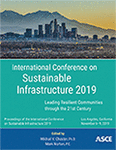International Conference on Sustainable Infrastructure 2019
The Relationship between Sustainability and Resilience of Food-Energy-Water Systems
Publication: International Conference on Sustainable Infrastructure 2019: Leading Resilient Communities through the 21st Century
ABSTRACT
The development of sustainable and resilient infrastructure systems to achieve food, energy, and water (FEW) security has received considerable attention in recent years. Despite this intense interest, only limited research has been performed on the similarities and differences of sustainability and resilience in a nexus context. It is the main purpose of this study to investigate to which extent does the sustainability of FEW systems enable us to successfully respond to the anticipated and the unexpected stresses and shocks. Unlike traditional approaches to study sustainability and resilience of FEW systems in a fragmented and isolated way, a literature review undertaken in this study is focused on integrated use of sustainability and resilience in a nexus context. Resilient FEW infrastructure are essential to the implementation of policies and actions with regard to sustainable development. A sustainable FEW system is defined as a system that can consistently meet its food, energy, and water demands with sustainable inputs rather than using non-renewable sources.
Get full access to this chapter
View all available purchase options and get full access to this chapter.
REFERENCES
Blackwood, J., Karan, E., Asadi, S., Mohammadpour, A., and Asgari, S. (2017). "Stochastic Optimization Model for Sustainable Water Treatment with Minimal Energy Use." Computing in Civil Engineering 2017, K.-Y. Lin, N. El-Gohary, and P. Tang, eds. Seattle, WA, 215-222.
Bocchini, P., Frangopol, D. M., Ummenhofer, T., and Zinke, T. (2014). "Resilience and sustainability of civil infrastructure: Toward a unified approach." Journal of Infrastructure Systems, 20(2), 04014004.
Derissen, S., Quaas, M. F., and Baumgärtner, S. (2011). "The relationship between resilience and sustainability of ecological-economic systems." Ecological Economics, 70(6), 1121-1128.
DHS (2013). "Partnering for Critical Infrastructure Security and Resilience", The Department of Homeland Security, 50.
Francis, R., and Bekera, B. (2014). "A metric and frameworks for resilience analysis of engineered and infrastructure systems." Reliability Engineering & System Safety, 121, 90-103.
Karan, E., and Asadi, S. (2018). "Quantitative modeling of interconnections associated with sustainable food, energy and water (FEW) systems." Journal of Cleaner Production, 200, 86-99.
Karan, E., Asadi, S., Mohtar, R., and Baawain, M. (2018). "Towards the optimization of sustainable food-energy-water systems: A stochastic approach." Journal of Cleaner Production, 171, 662-674.
Lew, A. A., Ng, P. T., Ni, C.-c., and Wu, T.-c. (2016). "Community sustainability and resilience: Similarities, differences and indicators." Tourism Geographies, 18(1), 18-27.
Marchese, D., Reynolds, E., Bates, M. E., Morgan, H., Clark, S. S., and Linkov, I. (2018). "Resilience and sustainability: Similarities and differences in environmental management applications." Science of the Total Environment, 613, 1275-1283.
Meacham, B. J. (2016). "Sustainability and resiliency objectives in performance building regulations." Building Research & Information, 44(5-6), 474-489.
Momoh, J. A., Meliopoulos, S., and Saint, R. (2012). "Centralized and distributed generated power systems-a comparison approach." Howard University, Power Systems Engineering Research Center, 1-26.
Nan, C., and Sansavini, G. (2017). "A quantitative method for assessing resilience of interdependent infrastructures." Reliability Engineering & System Safety, 157, 35-53.
Proag, V. (2014). "The concept of vulnerability and resilience." Procedia Economics and Finance, 18, 369-376.
Information & Authors
Information
Published In
International Conference on Sustainable Infrastructure 2019: Leading Resilient Communities through the 21st Century
Pages: 634 - 641
Editors: Mikhail V. Chester, Ph.D., Arizona State University, and Mark Norton, Santa Ana Watershed Project Authority
ISBN (Online): 978-0-7844-8265-0
Copyright
© 2019 American Society of Civil Engineers.
History
Published online: Nov 4, 2019
Authors
Metrics & Citations
Metrics
Citations
Download citation
If you have the appropriate software installed, you can download article citation data to the citation manager of your choice. Simply select your manager software from the list below and click Download.
